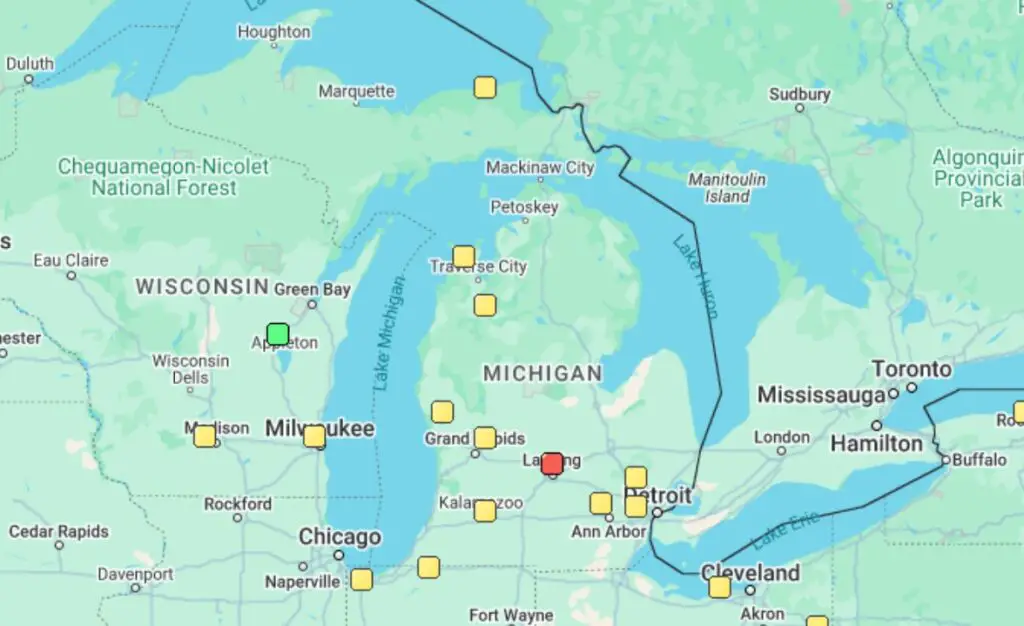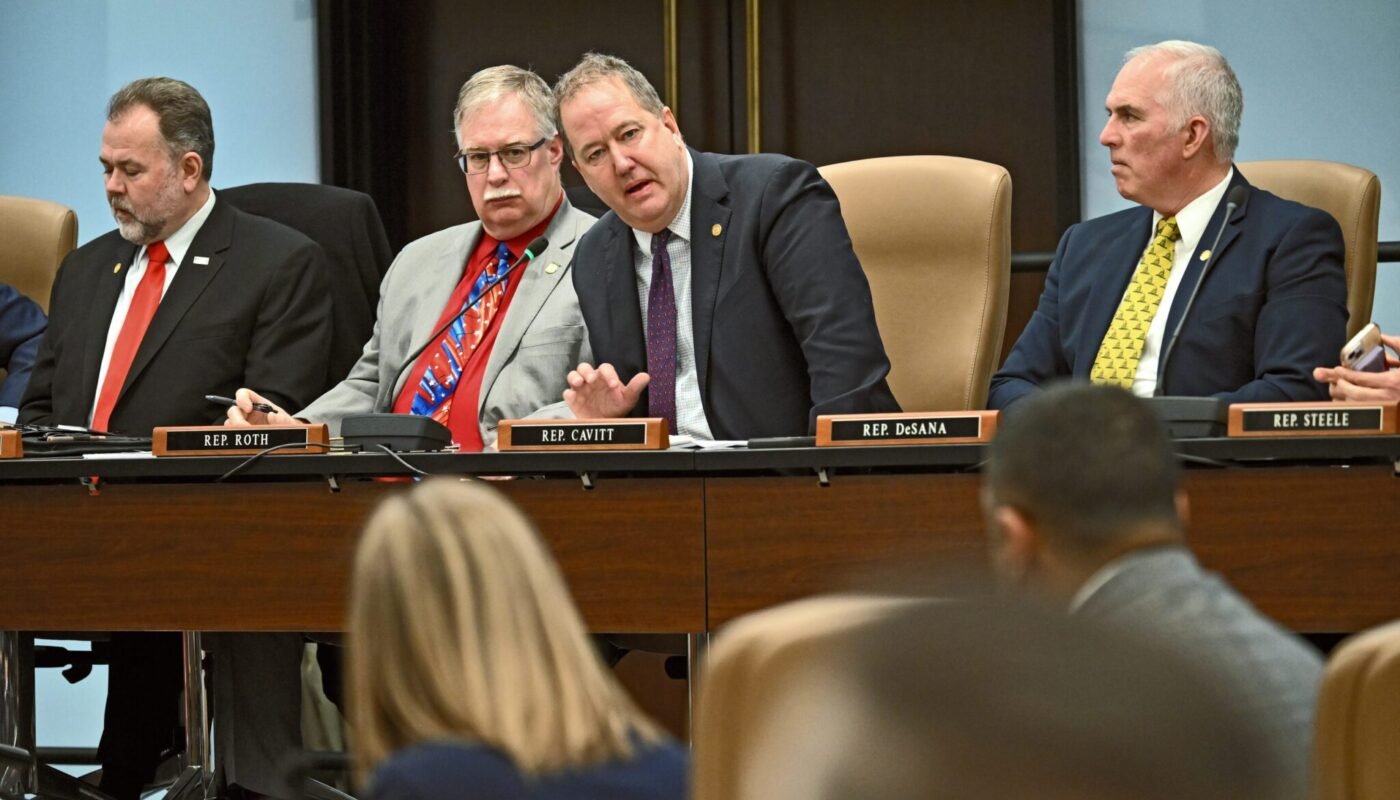State lawmakers take a stand against Michigan sanctuary cities policies by restricting state funding for non-compliant communities.
House Resolution 19 Strips State Funding from Sanctuary Cities
LANSING, Mich. – Michigan lawmakers have drawn a hard line against sanctuary cities, with a new resolution that eliminates state funding for communities refusing to comply with federal immigration enforcement. The Michigan House passed House Resolution 19, ensuring that no bill allocating state funds to sanctuary communities will reach a vote.
The measure, spearheaded by House Speaker Matt Hall (R-Richland Township) and supported by State Rep. Cam Cavitt (R-Cheboygan), takes effect immediately. The resolution is part of a broader effort to penalize municipalities that implement sanctuary policies by refusing to cooperate with federal immigration authorities.
“For far too long we’ve seen local officials seem to care more about drug dealers from Mexico or gang members from Venezuela than they do for their own friends and neighbors who follow the law and pay their taxes,” Cavitt said. “These communities are going to have to decide if they truly want to go it alone and whether protecting violent criminals from deportation is really more important than state funding.”
Michigan Aligns with Federal Immigration Crackdown
The resolution comes amid federal initiatives led by President Donald Trump and Border Czar Tom Homan, emphasizing the deportation of undocumented immigrants with violent criminal records. It follows the recent passage of the Laken Riley Act, named after a Georgia nursing student murdered by an undocumented Venezuelan national, which mandates federal detention of non-citizens accused of serious crimes such as burglary, assaulting a law enforcement officer, or causing serious bodily harm.
Michigan’s move reflects broader national trends, with Republican-led states imposing financial consequences on sanctuary jurisdictions. The resolution builds on prior state-level efforts, such as Cavitt’s 2024 Sanctuary Policy Prohibition Act and County Law Enforcement Protection Act, which sought to prevent municipalities from obstructing local law enforcement’s cooperation with federal immigration authorities.
Michigan Sanctuary Cities Face Tough Choices
Under the new policy, cities enforcing sanctuary protections risk losing substantial state funding. However, the measure does not eliminate constitutionally mandated revenue sharing, ensuring that affected municipalities still receive basic funding. Nevertheless, cities that rely on additional state support for infrastructure, public safety, or social programs now face financial uncertainty.
The move has sparked sharp debate, with proponents arguing that it reinforces law and order, while critics call it an attack on local governance and immigrant communities.
“This is about enforcing existing laws and keeping dangerous criminals off our streets,” Cavitt said. “We’re putting radical officials across Michigan on notice; they can stop their backwards efforts to roadblock federal officials and protect violent criminals, or else.”
Pushback from Sanctuary Advocates
Opponents of the resolution argue that it punishes entire communities over political disagreements and undermines local autonomy.
“This is a blatant attempt to strong-arm cities into following policies they do not agree with,” said Maria Gonzalez, an immigration rights advocate in Detroit. “Many communities adopt sanctuary policies to build trust between law enforcement and immigrant residents. Cutting off funding only makes it harder for local governments to serve their populations.”
Legal experts also warn that the resolution could face challenges in court, particularly regarding whether the state can withhold funds based on immigration policies that do not violate state law.
Known Sanctuary or Immigrant-Friendly Cities in Michigan:

As of recent reports, the following cities in Michigan have been identified as having some form of sanctuary policies or have declared themselves as welcoming to immigrants:
Ann Arbor: Similar to Detroit, Ann Arbor has policies that prevent local law enforcement from inquiring about a person’s immigration status unless they are suspected of a crime. The city cooperates with federal authorities when required.
Detroit: Detroit has anti-profiling ordinances that generally prohibit local police from asking about the immigration status of individuals not suspected of any crime. The city does not bar cooperation with federal authorities and assists Immigration and Customs Enforcement (ICE) when necessary.
Lansing: Designated as a “welcoming city” with policies limiting cooperation with ICE. In 2017, Lansing’s mayor issued an order prohibiting police officers from inquiring about residents’ immigration status. While the city initially declared itself a sanctuary city, it reversed the decision due to public and business opposition. However, policies limiting cooperation with federal immigration enforcement remain in place.
East Lansing: In January 2023, East Lansing officially declared itself a sanctuary city. The city council passed a resolution affirming its commitment to protecting undocumented immigrants and limiting local law enforcement’s cooperation with federal immigration agencies.
Michigan Sanctuary Cities Clarifications:
- Michigan does not have a statewide sanctuary policy.
- Many of these cities do not explicitly call themselves “sanctuary cities” but have local policies limiting cooperation with federal immigration authorities.
- Policies can change, so checking city council decisions or local government websites can provide the most up-to-date information.
Michigan Counties with Sanctuary/ Limited Cooperation Policies:
As of February 2025, Michigan has several county jurisdictions with policies that limit cooperation with federal immigration authorities. These are commonly referred to as “sanctuary” jurisdictions.
- Ingham, Kalamazoo, Kent and Wayne Counties: Have been identified as having policies that limit cooperation with federal immigration authorities.
- Luce, Leelanau, Wexford, Washtenaw, Muskegon, and Oakland Counties: Have limited cooperation with ICE with respect to Jail polices.
It’s important to note that policies and designations can change over time. For the most current information, it’s advisable to consult official city or county resources or recent government publications.
What’s Next for Michigan Sanctuary Cities?
Michigan now joins a growing list of states taking legislative action against sanctuary cities. While the resolution immediately affects funding allocations, it remains unclear how many communities will adjust their policies to comply.
With potential lawsuits on the horizon and continued political division over immigration policies, the fate of Michigan’s sanctuary cities remains uncertain.
As an Amazon Associate, I earn commission from qualifying purchases.



